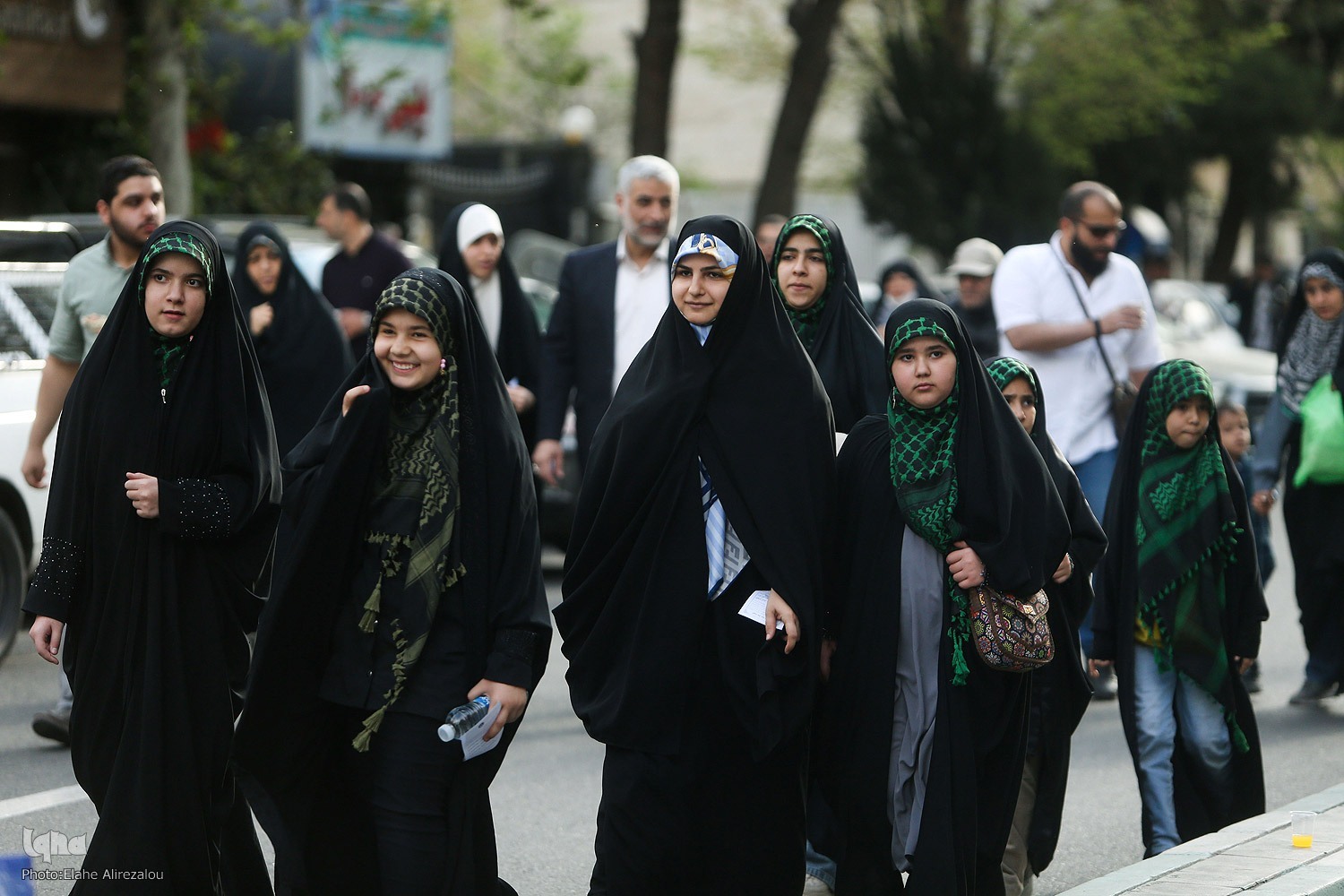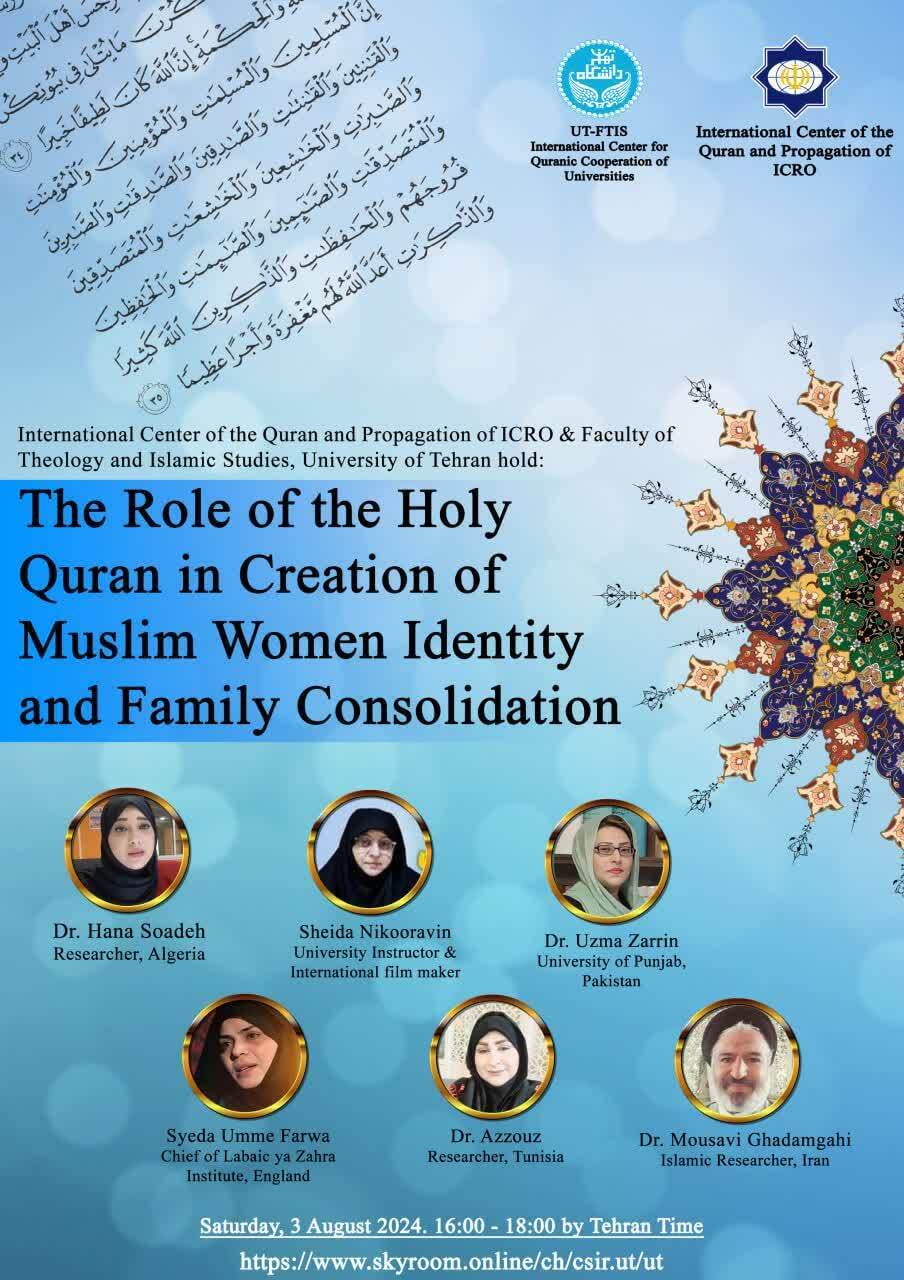Scholars Confer on Quran’s View on Women in Int’l Event

In cooperation with Tehran University's Faculty of Theology and Culture and Communication Organization, a webinar on the role of the Holy Quran in creation of the identity of Muslim women and family consolidation was held on the third of August with the participation of thinkers, university professors, students and those interested in the Holy Quran from all over the world.
In this webinar, scientists from Iran, Tunisia, Algeria, England, Pakistan, Turkey gave speeches. First, everyone listened to verses from the Holy Quran, and then Dr. Mousavi, a university professor, author, Quranic researcher and the scientific secretary of the webinar, welcomed the audience and spoke about the objectives of the webinar.
The first speaker was Seyedah Farwa, head of Labik ya Zahra Institute from London. She first discussed the importance of the Holy Quran as the most important source of Islamic sciences and then pointed out the place of the divine nature in human existence and activating it with the verses of the Holy Quran and said that each of the divine verses is like a password with which a person can activate his nature and achieve honor and respect and purity. Then he stated verses from the Holy Quran that show the same status for men and women before Almighty Allah.
The next speaker of this webinar was Dr. Ghazouz, university professor, researcher and media activist from Tunisia. He pointed out that the Holy Quran is suitable for the happiness of all people in all times and places. According to the Holy Qur'an, men and women have the same importance and position in the eyes of Almighty Allah. The Holy Quran respects women as much as it respects men, because both are from the same root. Therefore, men and women have the same economic and social rights and duties. However, the woman as a mother has special respect. In the Holy Quran, women were introduced as models for everyone. The mother of Maryam (PBUH) and the mother of Hazrat Musa (PBUH) are among them, but unfortunately, in many cases, women are abused in political and social fields.
Read More:
The next speaker was Dr. Hanna Saadeh, a university professor, researcher and writer from Tunisia. She discussed the unique position of women in the Holy Quran and stated that each man and woman have psychological and spiritual characteristics and as a result they have the same respect and spiritual, social and economic rights in the Holy Quran. She spoke about the role of women in the family and about Queen Bilqis, the mother of Hazrat Maryam (PBUH) and the mother of Hazrat Maryam (PBUH) as Quranic models for The guidance of all the people of the world.
The next speaker was Dr. Uzma Zarin, a poet, writer, and social activist. She first explained the position of women in the ignorance era and discussed Quranic models such as Asia (PBUH), Pharaoh's wife, and Maryam (PBUH). Then he mentioned the story of Prophet Moses (PBUH) and the daughters of Prophet Shoaib (pbuh) and explained the role of women in society and how men and women interact from the perspective of the holy Quran. Then he recited poems by Allamah Iqbal Lahori on the importance of Hazrat Fatima Zahra (PBUH) as the best example of chastity and dignity for all men and women.
The next speaker was Dr. Rabe Chetin, one of the professors of Ankara University, Türkiye. He pointed out that the Holy Quran addresses men and women as intelligent, responsible and dignified human beings. Man is mentioned in the Holy Quran as Khalifa and this position includes men and women. He rejected the point that it is stated in some books that Hazrat Hawa (PBUH) deceived Adam (pbuh).

The next speaker was Dr. Mousavi, university professor, Quranic researcher, writer, and scientific secretary. He discussed the special position of women as the inspiration for the concept of "Rahma" in the Holy Quran and said that the concept of rahma was inspired by the mother's womb, which is the center of mother's love for her child. This concept is expressed in the most frequent verse of the Qur'an, بسم الله الرحمن الرحیم and represents the high status of women.
By examining the verses of the Holy Qur'an, we come to the conclusion that the monotheistic concept of rahma in the Holy Quran is infinite love, he said. He then discussed the difference between the concepts of equality and justice and said that unlike the West, Islam emphasizes justice between men and women, not their equality. Each man and woman have special duties and rights according to their physical and mental characteristics, and their observance creates justice.
The next speaker of this webinar was Ms. Nikorvin, a university professor and media activist and researcher from Iran. He mentioned the sister of Prophet Moses (AS), the daughters of Shoaib (AS) and the wives of Prophet Ibrahim (AS) as Quranic models for the leadership of all the people of the world. Then he went on to express some of the views of women in the West and said that in one of the interviews, one of the American Muslim women said that when we Muslim women walk in the streets of America wearing a hijab, we are like moving mosques that give spirituality to the community.
In another interview, a woman from Bosnia and Herzegovina said that when we are forced to put our hijab in a bag when entering the university or other places, we feel like we are putting our head in it. Then he spoke about a case of women wearing Muslim hijab being proud in the world championships.



